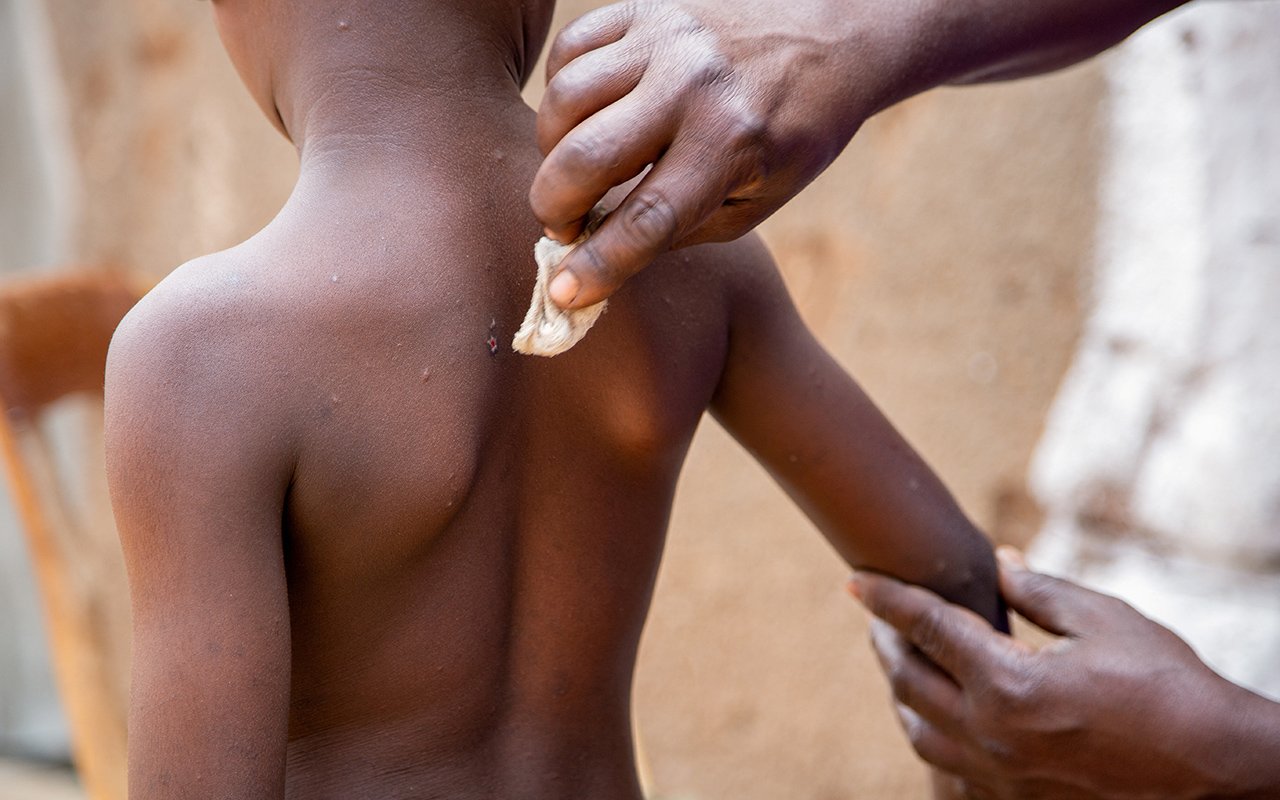Each region now has a case of Mpox - ministry

A man shows the marks on the skin of his six-year-old son after he recovered from mpox in Bujumbura, Burundi on August 28, 2024. PHOTO/ REUTERS
What you need to know:
- The Health ministry, however, says the outbreak of the disease is under control and measures have been put in place to avert any crisis.
Records from the Health Ministry indicate an expanding Mpox outbreak in the country with at least one infection reported in each of the four regions.
Statistics from the ministry indicate that Kampala (central) has reported one case, Mayuge District in the eastern region (1), Amuru in the northern region (1) and Kasese District in the western region (2).
Lt Col Henry Kyobe, the government epidemiologist at the Ministry of Health, said the government has a clear Mpox response plan and that efforts have been increased and put in place to contain the outbreak.
“The outbreak is under control and we shall do all that is possible to ensure it doesn’t go out of hand,” he told this newspaper, adding that they have increased surveillance and coordination with affected countries to curb the outbreak.
Lt Col Kyobe, however, expressed concern about the sexual network of truck drivers, which he said would increase the risk of disease. He urged the population not to stigmatise those infected with the viral disease.
“We are fighting stigma because that will lead us into problems. They will go underground and when they do so, they will transmit to their communities and their families and then subsequently, we shall have something spiraling out of control,” he said. “We should treat them with compassion and care and link them to facilities for treatment ensuring that they don’t transmit the virus.”
Dr Annet Alenyo, the World Health Organisation (WHO) Uganda national professional officer for case management, said they have trained health workers to have a high index of suspicion when handling any patient at health facilities.
She explained that Mpox disease manifests in two phases with the first phase characterised by headache, general body weakness, fever, chills and/or sweats, sore throat, muscle ache, enlarged painful Lymph nodes.
Dr Alenyo said “this is a challenge to health workers because other common disease like malaria also have such symptoms’’.
“That is why when you go to hospital, they will ask you questions like: “Is there someone with a rash in your home?” Those types of questions help guide the health workers to narrow it down to something,” Dr Alenyo said.
The second phase of the disease is called the rash phase. Dr Kyobe said it usually starts a few days after fever and swelling of the lymph nodes. He further said the rash starts in the part of the body that was initially exposed to the infection and eventually appears on the face and the whole body.
Mpox is known to be sexually transmitted.
Dr Jane Ruth Aceng, the Health minister, urged people to be vigilant and protect themselves from the infection.
“Avoid contact, wash hands with soap and water, do not share clothing or beddings, and avoid sex with partners that you don’t know,” she said.
Dr Kyobe explained: “As the rash progresses about two-four weeks, plaque (raised skin patches) is replaced by papules (a small pimple or swelling on the skin), blisters, pustules (a small blister or pimple on the skin containing pus), scabs, followed by shedding and re-epithelialisation (healing of the wound).”
The epidemiologist further said a severe Mpox disease is associated with a longer period of sickness, with the deadliness of Mpox depending on the clade (variant) of the virus, route of infection, and patient age.
“An infected person can spread the disease from the time they have signs and symptoms to the time all skin lesions have dried and new skin has formed,” he said.
Dr Alenyo said since there is no cure for the disease, the doctors provide supportive care, manage pain and check for other sexually transmitted infections as co-infection with HIV/Aids is known to increase death risks.
Dr Kyobe said people with Mpox should avoid physical or intimate contact with others, including sexual activity until lesions clear (condom use for 12 weeks post recovery). He appealed to the patients to avoid physical contact and not to share linen, towels, or personal care items with anyone with Mpox.
Dr Kyobe also called for regular practice of hand hygiene by washing hands with soap and water or using an alcohol-based hand rub.
“Practice respiratory hygiene: cover coughs and sneezes with your elbow or tissues, dispose of used tissues immediately after use, and wash your hands,” he said.
“If you develop symptoms, particularly if you have recently travelled overseas or had contact with a case, including sexual contact, you should seek care at your general practitioner or nearest sexual health clinic. It is important to contact the healthcare facility before your appointment; to ensure they can separate you from others. Make sure to wear a surgical mask and cover any skin lesions,” he added.
Background
On July 24, Uganda confirmed its first two cases of Mpox in Kasese District and subsequently declared an outbreak on August 2. By August 22, five confirmed cases had been reported. Sources within the ministry indicate that cases have now increased to 10.



